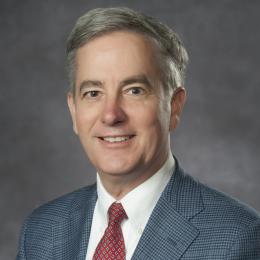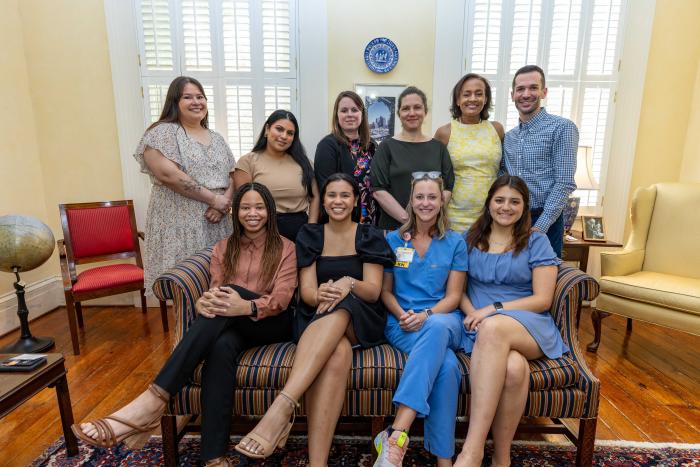
Leaders from the three major research universities that host the International Programme in Addiction Studies gather each year to review and plan ahead for the global online partnership. (L to R) Mary Loos, Ph.D., VCU IPAS program director; Dace Svikis, Ph.D., VCU IPAS program co-director; Anna Williams, Ph.D., Kings College of London IPAS program director; Andrea Gordon, Ph.D., University of Adelaide IPAS program director; Robert Balster, Ph.D., VCU IPAS program founder. Photo: Eric M. Peters, MCV Foundation
A Pioneer in Addiction Studies Establishes Scholarship
Nearly 20 years ago, a group of researchers and educators from around the world began discussing needs for global education in addiction science.
There was a large gap between the knowledge about science-based treatment and prevention, and their implementation.
“Addiction is an unusual disease in that countries treat it very differently,” said Robert Balster, Ph.D., a VCU School of Medicine professor who led international discussions addressing the emerging issue. “Some countries are very punitive, while some countries treat it like a medical problem and employ extensive involvement of health authorities.”
Dr. Balster and his colleagues decided an important first step in understanding and addressing these issues was to establish a global graduate education program in addiction science and policy — the International Programme in Addiction Studies. There were very few graduate addiction programs anywhere in the world at the time, and in many countries that needed it most, there were none.
It’s become increasingly obvious to me over time that this is the right thing to do with the resources I’ve accumulated over my 78 years.
Robert Balster, Ph.D., VCU School of Medicine professor
The IPAS program is a unique collaboration of three of the world's leading research universities in addiction science: King's College London, the University of Adelaide in Australia, and VCU. Students are introduced to the latest information on topics ranging from the biological basis of addiction to treatment, prevention and policy.
Now in its 15th year, IPAS has trained more than 100 students from 28 countries on six continents who have gone on to develop and administer addiction treatment programs, shape law enforcement and public policy, and advise global leaders.
Despite the program’s success, the critical access component of IPAS still wasn’t completely solved for Dr. Balster, who joined VCU’s Department of Pharmacology and Toxicology in 1973.
“Our biggest lingering problem is that we have so many students who want to enroll in the program but simply can’t afford it,” he said. “Our tuition is in line with other graduate programs in the U.S., but that’s incredibly prohibitive for someone from a low-or middle-income country whose annual salary might not even cover costs.”
That’s why, in 2023, Dr. Balster pledged $400,000 to create the Robert L. Balster Scholarship to help students pursue the addiction science education he believes is so important. Once fully funded, the scholarship will provide $15,000 every year for IPAS tuition.
“It’s become increasingly obvious to me over time that this is the right thing to do with the resources I’ve accumulated over my 78 years,” he said.
Thanks and praise have come from many colleagues, including Bill Dewey, Ph.D., longtime professor and chair of the Department of Pharmacology and Toxicology at VCU and a world-renowned leader in the field.
“This is an amazingly generous contribution from Dr. Balster that will support scholarship in addiction studies throughout the world,” Dr. Dewey said. “He has remained committed to excellence throughout his career as an outstanding, innovative and intelligent scholar — and now this. He continues to contribute to the global addiction studies landscape in so many ways.”
To learn more about how you can support the Robert L. Balster Scholarship contact Brian Thomas, the MCV Foundation’s vice president and chief development officer.



